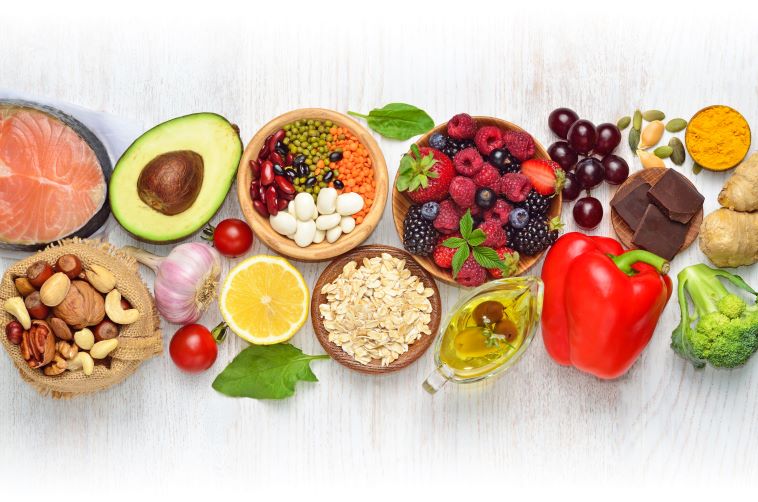What are micronutrients?
Micronutrients (vitamins and minerals) are molecules required by the body in small amounts for a variety of essential processes. Most micronutrients cannot be synthesised by the body, so it is essential to obtain them from the diet. This article discusses the main classes of micronutrients, outlining their biological uses and good food sources to obtain them. When thinking about consuming vitamins and minerals, you should take a 'food first' approach, and aim to get micronutrients into the body by eating a wide variety of foods. Supplements should only be used where this is not possible.
Molecules present in plants (phytonutrients) have health benefits e.g. reduction in inflammation. The role of phytonutrients will not be discussed in detail here. Check back for further blogs on this subject!
Electrolytes
Sodium, potassium and chloride ions are essential to the regulation of water balance within the body, and can play a role in dehydration, hyperhydration and thirst.
Deficiency
A Deficiency of sodium, chloride and water can lead to characteristic symptoms of dehydration – thirst, physical exhaustion, reduced blood pressure, cold extremities. This can impact health and performance within a sporting context.
Excessive sweating, not drinking enough, long exercise duration or exercising in extreme environments (eg. very hot) can lead to dehydration. In these circumstances replacement of electrolytes by use of one of the many proprietary sports drinks is usually sufficient.
You should aim to drink to thirst, and ensure hydration is sufficient for the context.
Calcium
There is approximately 1kg of calcium in the adult skeleton but this is not a static, inactive store. This calcium is in constant flux between the skeleton, kidneys and intestine via the blood. This balance is maintained by many hormones, although external factors such as growth, pregnancy or ageing will also affect calcium balance. Calcium is also required for muscle contraction and healthy teeth. It is primarily found in dairy products but is also present at significant levels in dark green vegetables, oily fish with edible bones (e.g. canned sardines and salmon) and pulses.
Magnesium
The skeleton contains up to 60% of total body magnesium. Magnesium is essential for muscle contraction, formation of DNA and is a catalyst for many reactions such as the release of energy from ATP. Deficiency has been linked to muscle spasms, cardiovascular disease, high blood pressure and diabetes. Magnesium can be found in dark green vegetables, nuts, seeds, whole grains and dark chocolate.
Iron
Iron has vital functions in the body, as a carrier for oxygen (as part of haemoglobin in blood cells and myoglobin in muscle tissue) from the lungs, as a transporter in the ATP generation pathway and as an integral part of many enzyme controlled pathways.
There are two types of iron in the diet – haem and non haem, each with a different mode of absorption from the intestine. Haem iron is present in meat and meat products, whereas non-haem iron is found in plant based products such as dark green vegetables, dried fruit, etc. Haem iron is relatively easily absorbed whereas non-haem iron is influenced by the iron status of the individual. In addition, its absorption is facilitated by vitamin C and meat products and inhibited by calcium, fibre, soy protein and phytates e.g. in grains, fruit, vegetables, seeds and nuts.
Deficiency of iron, where insufficient amounts are mobilised from iron stores, can lead to anaemia. Symptoms include reduced endurance in relation to physical activity, as oxidative metabolism (and ultimately ATP generation) is impaired. Memory and learning may also be affected. Pregnancy is a common time in which iron deficiency anaemia may occur due to the increased demands on the body. Treatment is usually via supplements followed by education on better food choices. Athletes may also have lower iron stores and this should be considered in line with monitoring sport performance.
Zinc
Zinc is an essential mineral, required for normal growth of animals and humans. It is a constituent of certain enzymes and acts to stabilise cell membranes. In this way, it plays a role in DNA synthesis, protein digestion and synthesis, carbohydrate metabolism, oxygen transport and protection against free radical damage.
Good sources of zinc are dark red meats with a low fat content and unrefined (whole) grains. However, its absorption is hindered by phytates in wholegrain cereals and other vegetables. Animal protein enhances zinc absorption
Fat soluble vitamins
A diet containing fat is required for the absorption of certain vitamins, and for the production of hormones which are created with a fatty layer.
A diet deficient in vitamins will produce typical symptoms. Be aware however, that over nutrition of vitamins can cause similar symptoms.
Vitamin A
Vitamin A has two major forms- the animal based retinol, found in liver, dairy products and oily fish; and the plant derived ß-carotene, found in orange and dark green vegetables and palm oil (the latter have a lower potency than animal derived vitamin A). Vitamin A is absorbed in the small intestine and mainly stored in the liver.
The best known role of vitamin A is in vision, particularly night vision. Other major functions are in cell differentiation (i.e. control of gene expression in different cell types, be they a liver or brain cell) and the immune system’s responses to infection.
Deficiency is characterised by night blindness, particularly in the developing world. Dietary inadequacy also increases the risk of infections, especially in children.
Vitamin D
Vitamin D is primarily synthesised in the skin via exposure to UV light, although it can be found in relatively low levels in oily fish, eggs and fortified cereals. It has a hormone like action, controlling the absorption of calcium from the intestine and the flux of calcium between the bones and the circulatory system. Vitamin D plays a role in immune function and muscle contraction so it is essential for health and sporting performance. Most adults in the northern hemisphere are deficient in Vitamin D during winter months, however this can be rectified via dietary supplementation.
Vitamin E
Vitamin E is an essential source of antioxidants within the body which can help to combat inflammation within cells. Vitamin E can help maintain healthy skin and eyes and improve immune function. Dietary sources of vitamin E include seeds, nuts, avocado, leafy greens and oils. Deficiency is characterised by muscle and nerve damage, and some types of anaemia. Vitamin E deficiency is very rare, as it is usually caused by irregularities in metabolism and fat absorption.
Vitamin K
Vitamin K plays a role within bone health and blood clotting which helps wounds to heal. Dietary sources of Vitamin K include spinach, asparagus, soy, eggs and liver. Deficiency can lead to poor wound healing and in some cases osteoporosis. Deficiency is rare, however can occur in people taking certain medications that block Vitamin K metabolism.
Water soluble vitamins
Vitamin B
B vitamins are a class of water-soluble vitamins that play important roles in cell metabolism and synthesis of red blood cells. There are eight different B vitamins. Dietary sources include meat, fish, milk, fortified cereals, almond and eggs.
Vitamin B12 is not found in plant sources, as such, people who follow a plant based diet should check their levels of B12 for deficiency.
Vitamin C
Vitamin C is a powerful antioxidant within the body and can help with controlling infections and immune support. It is required to make collagen which is essential for connective tissue. Vitamin C can be found in citrus fruit, peppers, strawberries and tomatoes. Symptoms of deficiency include scurvy, hair loss, poor wound healing and fatigue.
A diet rich in essential micronutrients is the best way to combat unwanted health issues. Choosing a 'real food' approach to your diet ensures that you are consuming a variety of nutrients essential to health. By incorporating performance meals into your day you can ensure that you are not only achieving your daily calorie and macronutrient targets, but also improving longevity and health which translates into improved performance both inside and outside the gym.
Complete article provided free with our Diet Packages

